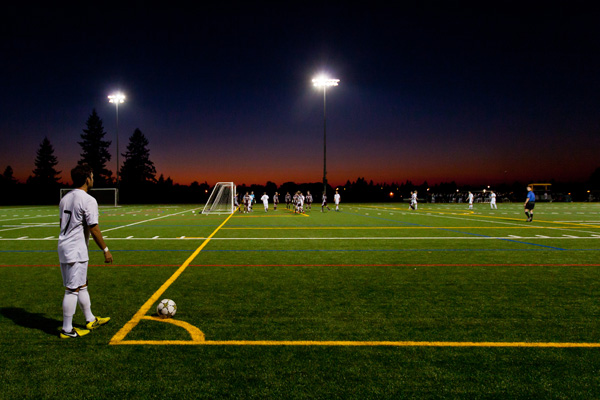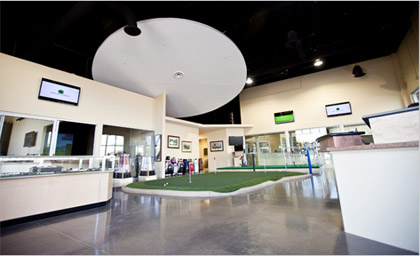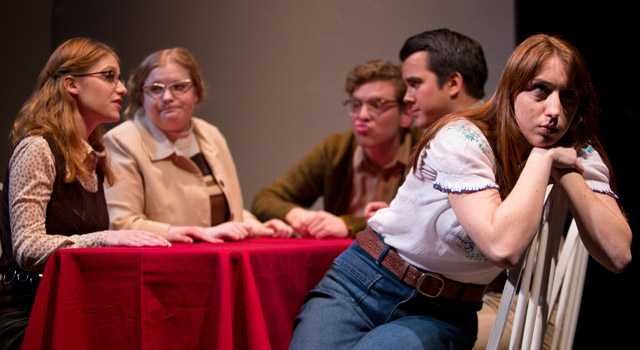Page 23 • (12,431 results in 0.037 seconds)
-
Department of Anthropology (pdf) view download
-
Department of Anthropology (pdf) view download
-
July 7, 2008 Next of kin: the ethics of eating, capturing, and experimenting on great apes One of the pressing problems of our times is the future of the great apes. All of the great apes – chimpanzees, bonobos, gorillas and orangutans – are endangered. Their habitat is quickly shrinking, but more urgent, their numbers are fast approaching an unsustainable low. Currently, the main threat is the bush-meat trade (which also involves the logging of African forests). It is now thought that the
-
June 16, 2009 Matters of Faith By Patricia O’Connell Killen, Ph.D. Provost and Dean of Graduate Studies Professor of Religion At PLU, students talk about spirituality. They think about the meaning of life – human experiences of love, joy, creativity, success, suffering, death, of making and keeping commitments, of extending oneself on behalf of others. Students grapple with the meaning of integrity. They seek to find a purpose, something that is, in the words of some of my former students
-

November 12, 2012 Shane Gutierrez takes a corner kick at PLU’s new soccer complex. Photo by John Froschauer. Fields of Dreams Changes to PLU’s athletic facilities will improve not only the student-athlete experience, but the experiences of all students By Steve Hansen In many ways, the season-opening 4-2 victory over Trinity Lutheran College was like so many women’s soccer matches on PLU’s lower campus. It was a beautiful blue-sky summer day with gray-and-white striations of Mt. Rainier
-

February 5, 2013 Economics of golf By Jesse Major ’15 An unconventional approach to economics that allows students to shoot lasers and travel PGA tour destinations was taught this J-Term by Mark Reiman, associate professor of economics. This class, The Economics of Golf, was inspired by a book called Golfonomics – not Reiman’s golfing skills In The Economics of Golf, students met with owners of golf courses in Tacoma, Monterey, Palm Desert and Phoenix, as well as officials of the PGA tour to
-

March 9, 2013 As part of the SOAC Focus Series – Empowerment, there was a discussion with PLU students and the cast of “How I Learned to Drive.” (Photos by John Froschauer) Facets of self By James Olson ’14 Since its 1997 debut off-Broadway, Paula Vogel’s “How I Learned to Drive” has proven an emotionally rickety experience for actors and audiences alike. Straddling a line somewhere between uncomfortable and redemptive, the play focuses on the sexually abusive relationship between Lil’ Bit
-
Dean’s Welcome PLU School of Nursing Overview History Guiding Principals, Vision, Mission Philosophy SoN Strategic Planning Framework and Initiatives 2022 SoN Program Outcomes Integrated Learning Objectives School of Nursing Organization Chart School of Nursing Leadership Team Administrative Office Accreditation and Approvals PLU School of Nursing Accreditation Washington State Rules Governing Nurse Education Programs SoN Program Improvement Plans Helpful Acronyms School of Nursing Organization
-
The School of Nursing reserves the right to reassign students to a new faculty advisor when need arises. Such changes most often occur when faculty leave the department, when new faculty are hired, and/or when a faculty member’s availability and/or status changes. Students are also allowed to request a change of advisor. A change of advisor form is available from the School of Nursing office. Keep in mind that change of advisor request is not granted unconditionally. Students benefit greatly
-
The PLU School of Nursing is committed to actively cultivating and promoting safe and respectful environments to ensure equitable opportunities for all students, faculty and staff to learn and work to optimal capacity. Learning environments, structures, systems, policies, and procedures will be based on a positive, productive culture of meaningful, collaborative relationships and attention to a safe, orderly, and respectful learning and working environments. This respect is illustrated by the
Do you have any feedback for us? If so, feel free to use our Feedback Form.


